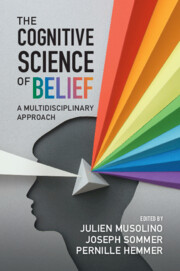The Cognitive Science of Belief
Beliefs play a central role in our lives. They lie at the heart of what makes us human, they shape the organization and functioning of our minds, they define the boundaries of our culture, and they guide our motivation and behavior. Given their central importance, researchers across a number of disciplines have studied beliefs, leading to results and literatures that do not always interact. The Cognitive Science of Belief aims to integrate these disconnected lines of research to start a broader dialogue on the nature, role, and consequences of beliefs. It tackles timeless questions, as well as applications of beliefs that speak to current social issues. This multidisciplinary approach to beliefs will benefit graduate students and researchers in cognitive science, psychology, philosophy, political science, economics, and religious studies.
- Brings together a wide range of scholars, ideas, and approaches under a common umbrella
- Provides readers with an overview of key concepts, questions, and findings from multiple disciplines
- Promises to illuminate a host of issues of broader societal importance and bridge the gap between theoretical and applied work
- Broadly relevant and of interest to many fields, including psychology, politics, and religion
Reviews & endorsements
'Readers, whether researchers or professionals, will find a rich, nuanced deep dive into the complex nature of belief … Recommended.' S. Reysen, Choice
Product details
November 2022Paperback
9781009009850
584 pages
228 × 152 × 32 mm
0.91kg
Available
Table of Contents
- Introduction Joseph Sommer, Julien Musolino and Pernille Hemmer
- Part I. Understanding Belief:
- 1. The cognitive science of 'belief' (the word) Ray Jackendoff
- 2. The science of belief: a progress report Nicolas Porot and Eric Mandelbaum
- 3. The role of context in belief evaluation: costs and benefits of irrational beliefs Elly Vintiadis and Lisa Bortolotti
- 4. How and why does schematic knowledge affect memory? Qiong Zhang
- 5. Probability, belief, and the richness of cognition Steve Piantadosi
- 6. Intuitive and reflective beliefs Dan Sperber
- 7. Intuitive and reflective beliefs in a modern world Bastien Trémolière and Florence Lespiau
- 8. Do cultural misbeliefs cause costly behavior? Hugo Mercier and Sacha Altay
- 9. Cultural evolutionary psychology of belief Theiss Bendixen and Benjamin Grant Purzycki
- Part II. Domains of Beliefs:
- 10. Religious beliefs Pascal Boyer
- 11. Essentialist views of criminal behavior predict increased punitiveness Justin W. Martin, Sophie Charles, and Larisa Heiphetz
- 12. Political belief formation: Individual differences and situational factors Lala Muradova and Kevin Arceneaux
- 13: Americans' lack of political beliefs and the consequences for democracy Yalidy Matos and Katherine McCabe
- 14. Thoughts and players: an introduction to old and new economic perspectives on beliefs Andras Molnar and George Loewenstein
- 15. How intuitive beliefs inoculate us against scientific ones Andrew Shtulman
- 16: COVID-19: conspiracies and collateral damage vs. constructive critique Stephan Lewandowsky, Konstantinos Armaos, Hendrik Bruns, Philipp Schmid, Dawn Liu Holford, Ulrike Hahn, Ahmed Al-Rawi, Sunita Sah, John Cook, Marie Juanchich and James Ladyman
- 17. Believing in race vs. knowing ourselves Guy Harrison
- Part III. Variation in Beliefs:
- 18. Delusions Philip R. Corlett
- 19: delusions and beliefs as a symptom of illness Eisuke Sakakibara
- 20. The elusive search for individual differences in myside thinking Keith E. Stanovich and Maggie E. Toplak
- 21. Modeling individual differences in beliefs and opinions using thurstonian models Michael Lee and Michelle Y. Ke
- 22. Belief in human rights: an opportunity for cross-cultural cognitive science Jordan Kiper
- 23. The belief-action gap in environmental psychology: How wide? How irrational? Aurore Grandin, Mélusine Boon-Falleur and Coralie Chevallier
- 24. Training can improve decision making Irene Scopelliti
- 25. Building better beliefs through actively open-minded thinking Emlen Metz.








